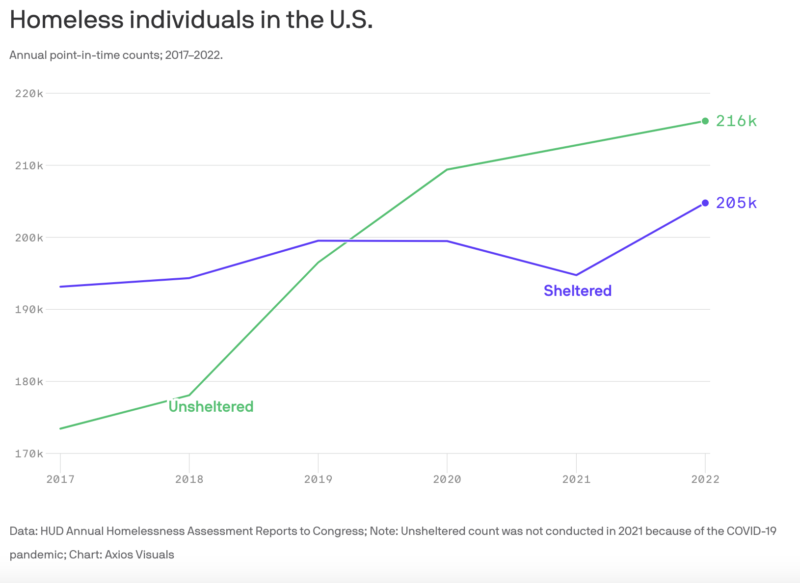
Street homelessness in the United States is dramatically on the rise, experiencing a 25 percent increase since 2017, according to the U.S. Department of Housing and Urban Development.
Despite billions of federal dollars being spent on support services and shelter space, cities still struggle to keep up with the demand, especially in west coast areas where homelessness is pervasive and encampments are sprawling.

California has the nation’s highest homelessness rate. The state has roughly one-third of all the country’s homeless people, and Los Angeles, San Jose and Oakland have among the largest numbers of unsheltered people in the country.
Shelters are working nationwide to accommodate as many individuals as they can, but DHUD found that shelters were only able to accommodate for 181,786 individuals, despite an estimated 421,392 individuals experiencing homelessness as of January 2022. At the same time, eviction filing rates have not only returned but also exceed pre-pandemic levels in many popular U.S. cities as housing costs and inflation continue to rise.
COVID-19 forced cities to quickly find private rooms for unhoused people to practice social distancing. Some cities, like Phoenix and Denver, have used federal COVID aid money to buy hotels for people experiencing homelessness. But shelter conversions can take a year or more to get up and running.
Terence Lester, author of When We Stand: The Power of Seeking Justice Together, spoke with RELEVANT about how the Church can better address the rising homelessness crisis.
“I deeply think that churches should get involved with organizations,” he said. “We’ve had a number of churches and communities of faith get involved in the work that we do to affirm the dignity of people who are experiencing homelessness. And I can tell you, there are times when it hasn’t been a good witness for people who don’t believe in Jesus to see church people fighting about whose name will get recognition. But then there has been really powerful and transformative times when we’ve seen faith-based communities come together in the name of God to take the love of God beyond the four walls of the church.”
Lester also wants Christians to remember that caring for the homeless is a Biblical commandment, not a suggestion.
“Just because a person doesn’t have an address does not mean that they’re not your neighbor,” he said. “When Jesus says, ‘Love your neighbor,’ he’s also talking about people who are experiencing homelessness.
“I think what we have to do, as believers, is see people who are living on the streets the same way you would see someone sitting next to you in church holding a cup of coffee,” he continued.” God doesn’t love the person next to you in a church that drove there anymore than the person who had to sleep behind a building. And if we are really going to be about loving our neighbors, that also includes people without an address.”






















